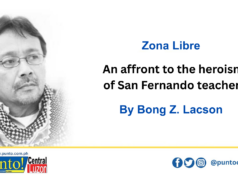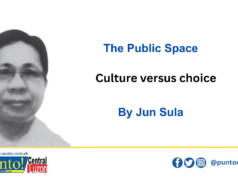WITH 64 or so days to go before D- Day, what would Christmas 2020 be like to the Pampanga business community and its shareholders with the pandemic virus still lurking in every nook and cranny of the once exciting countryside landscape?
Generally, there’s an encouraging beacon, or bacon, if you wish.
Experts say that we’re rounding the corner of the virus crisis, and can look forward to better days — not the pre-Covid ones, for sure — but better than what we have been going through since the longest lockdowns in the universe began.
Joyce del Rosario, executive director of the Pampanga Chamber of Commerce and Industry, one of the most active business chambers before COVID 19 storm blew into town, cites at least three reasons why things are looking up.
Some businesses are picking up, especially the essential ones. Their activities cannot, by any scale or scope, be imaginably compared to their frenetic buzz before the crisis set in, but it’s moving closer to that before the moving lockdowns were imposed.
(I told Del Rosario tbat the once ubiqutous ham in difference sizes and packages are not visible or available yet in malls and supermarkets. She had an easy answer: they’re not essentiall goods. Wow! Yet it seemed that way before the pandemic and way, way back when politicians’ favorite giveaways were hams. Of course, there was ASF before COVID 19 and everthing else came in alphabet soup aftewards).
In future adversities, the lessons of lockdowns, good and bad, should be carefully studied by thinking leaders because it’s what did business in for the most part. Both science and economics should weigh in in public debates . Politicians who give away hams should be consulted as well. There could be some connection between public works and porcine kindness.
Another reason the PAMCHAM official noted is the improving consumer confidence. It’s now back anywhere from 30 to 50 percent , presumably rising from basically zero. Numbers are improving in dine -in restaurants notably.
And this, essentially, is at the core of an advisory letter from PAMCHAM prexy Rene Romero to their member companies in appealing to them to already release the 13th month pay to their workers.
Apart from performing the “critical responsibility of the employers to employees”, Romero also mentioned the need to stimulate consumerism, probably locally first. Charity, after all, must begin at home.
When the government dangled loans to beleaguered enterprises that looked they were going the way of the dodo, Del Rosario observed that there were practically no takers. The business owners did not grab the cheap loans for fear they would not be able to pay because they themselves have lost their customers. A chicken- and -egg dilemma.
So, in Romero’s letter, the objective is evident: it was meant not only to improve the financial status of their workers but give them something to plow back in the revenue fields of companies. This conjures up an imagery where fertilizer is put into the ground first before the growth sprouts up above the surface.
The letter was a bit cryptic, politely nuanced when Romero said it was also an appeal to the employees. The message: we help you but also help us by spending the money we give you. It’s a win-win paradigm.
Adam Smith might have interjected: the economy is the people, stupid.
Romero’s understanding, not so much compassion as it is business or economic sense, might have been rubbed off on him by his predecessor, the late Levy Laus,who’s been a prime exponent of human value in the business setting.
Laus, a dyed-in-the-wool Smith disciple where real corporate responsibility lies, was wont to say that if you take care of your people, people will take care of your business. It may not be an original idea, Laus being an avid reader of successful leaders in the business world, but it’s good corporate practice he’s taken to heart when he was alive.
After Pampanga overcame lahar threat in the 90s, Laus would recall that he once told his people to take care of his business conglomerate while he took care of the lahar problem nipping at door of San Fernando. He might not have done it with perfect consistency, but the effort and willingness was there.
In fact, the Laus Group is said to have given the 13th month pay in tranches as early as April this year, long before Romero’s letter, dated October 7, came out of the woodwork. Other local companies could have done the same,too.
PAMCHAM has around 550 member companies and, by Del Rosario’s estimate, have from 25,000 to 30,000 employees. Given this size, the impact of the 13th month pay on boosting local consumerism and perking local business should move the needle north. As in a compass, this should indicate if the countryside is moving in the right direction.
Well and good as far PAMCHAM’s letterhead slogan of priming the countryside is concerned.
Christmas lights and Christmas trees, regardless of their height or brightness, can surely help in changing the gloomy gestalt of the season ruined by an invisible precursor.
But something, as substantive as a 13th month pay that can put more food on the table and improve the ordinary worker’s buying power, can go a long, long way in pushing the adversity aside. Or make the existential challenge more bearable especially during this special season when the thoughts are on the “near and dear”, as the classic song goes.





